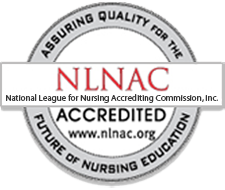The emergence of nursing programs everywhere is the way to answer the influx of nursing students. Nursing schools are struggling to accommodate the growing number of nursing students that is why many nursing programs seem to be popping up all over. With so many options, one way for students to identify a quality nursing program is through national accreditation. Nursing programs that have national accreditation are assured to have achieved established goals and meet expected standards and outcomes because accrediting bodies will hold them accountable.
While it is not required for a nursing student to be in a nursing program that is accredited by the NLNAC (National League for Nursing Accrediting Commission) or CCNE (Commission on Collegiate Nursing Education) to take the NCLEX (National Council Licensure Exam), there are advantageous points for students to be in an accredited nursing program. Accreditation with either the NLNAC or CCNE can affect the student’s financial aid eligibility. If the program is not accredited, the student may not be eligible for federal or state financial aid, employer tuition reimbursement programs, scholarships, or grants.
NLNAC and CCNE have similar criteria and standards. However, the difference is the accreditation periods between individual schools and programs. The type of programs being accredited is also another difference between the accreditation organizations. CCNE only accredits bachelor and master programs while NLNAC accredits all types of nursing education programs. It includes undergraduate (practical, diploma, associate, and bachelor) as well as graduate (master and clinical doctorate) programs. The list of programs accredited for both NLNAC and CCNE is posted in their respective websites.
Knowing this information, it is important to use caution when selecting a nursing program to be in. Accreditation is one aspect you should consider in a nursing program. Which accrediting organization is the program accredited and why did they choose the particular body?
